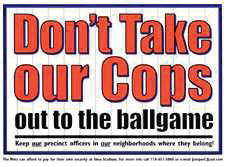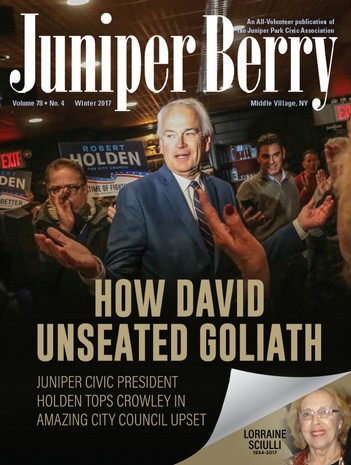(May 23, 2002) During every New York Mets home game, dozens of police officers are taken from local precincts and assigned to patrol Shea Stadium and the outlying Flushing area. And, since September 11th the number of NYPD officers present at each game has doubled.
But residents living within the confines of the 104th Precinct are angry, insisting that no more officers be assigned to Mets games from their notoriously understaffed police station.
In a Cop 104 meeting held last Wednesday in Middle Village, Bob Holden, president of the Juniper Park Civic Association and Roe Daraio of Citizens Of Maspeth and Elmhurst Together, outlined their new “Don’t Take Our Cops Out To The Ball Game” campaign.
Holden already has designed a poster bearing the campaign’s name which he plans to put wherever local residents can see them.
The Juniper Park Civic Association, in collaboration with several other community activists and civic groups, also plan to get residents of the communities served by the 104th Precinct—Ridgewood, Glendale, Middle Village and Maspeth—to sign a petition they will present to the NYPD. Other plans include a letter-writing campaign to both the Mets and the Police Department.
A secondary objective of the campaign is to push into law a tax that collect funds from the Mets and other similar entertainment-related corporations, every time NYPD officers are assigned to the area.
Holden plans to speak with Assemblywoman Catherine Nolan and City Councilman Dennis Gallagher about sponsoring the legislation.
On any given Mets game, Queens Borough Patrol North assigns 60 to 85 officers to cover the stadium area—10 to 12 of them coming from the 104th Precinct. With only 149 officers, they have the lowest number in the borough, according to Precinct Captain Peter Loehle.
The precinct’s most recent crime statistics support the need for officers to be on duty in their area as much as possible. Burglary is up 24 percent from 240 incidents last year to 296 within the first five months of 2002. Robberies this year have already topped last year’s numbers.
“We’re trying to put pressure on the mayor and the police commissioner to keep officers in the neighborhoods they cover,” Holden said. “Response time has improved for the precinct, but it is still one of the city’s slowest. It’s not that these cops don’t care, it’s that there just aren’t enough of them to handle a population as large as ours.”
According to the NYPD, the 104th Precinct’s jurisdiction covers 7.5 square miles, over 150,000 people, 27 elementary schools, four junior high schools and three high schools.
“A multi-million-dollar ball club like the Mets should pay for their own security instead of asking the city to make officers trained to fight crime perform guard duty for their games,” Holden said. “When they do this, they drain the city of their resources and they leave neighborhoods that are lacking adequate police to begin with in an even worse situation.”
However, according to Dave Howard, senior vice president of business and legal affairs for the Mets, the team already does its part to keep the stadium and its fans safe.
“We have at least 100 of our own security guards present during every home game,” Howard said.
“The police merely patrol the grounds surrounding the stadium such as the parking lot and the lot’s entrances.”
Safety measures at the stadium have dramatically increased since September 11th. Backpacks, briefcases, packages, bags, camera cases, video equipment, glass and plastic bottles and coolers are now prohibited at Shea.
In addition, everyone entering the stadium now undergoes a security screening involving metal detectors, manual frisks and searches of fans’ belongings. Vehicles entering the stadium’s parking areas may also be subject to search.



